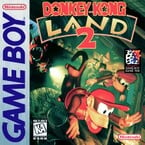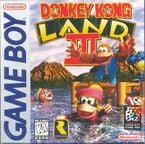Donkey Kong Land (series)
Template:Series-infobox The Donkey Kong Land series is an 8-bit video-game series in the Donkey Kong franchise, created by Rareware for the Game Boy systems. The series' three games star Donkey Kong, along with other members of the Kong clan, Diddy, Dixie and Kiddy, who travel through numerous levels in order to defeat King K. Rool and his aliases.
The series is based on the Donkey Kong Country series, an SNES series of games. Every Super Nintendo Entertainment System game in the Donkey Kong Country series has a Donkey Kong Land game released alongside it and the two series share characters, plots and music.
Every game in the series can be played in enhanced form on a Super Game Boy, where they all have different special borders and feature more colors, except for the Game Boy Color remake for Donkey Kong Land III.
Lists of Games in the Series
| Title | |
|---|---|
| Cover, original release and system | Synopsis |
| Donkey Kong Land | |
 Template:ReleasedGame Boy |
The first installment in the Donkey Kong Land series is Donkey Kong Land, released for the Game Boy in 1995. While some music and enemies are similar, it features fewer similarities to its Country counterpart than later installments, with a different set of levels and environments. It does, however, lack several features seen in the Super Nintendo game, such as Donkey Kong's Hand Slap move, and the level names are not displayed on-screen (they can be found in the instruction manual).
The game's story is an addition to the story in Donkey Kong Country; Cranky Kong believed that the apes' latest adventure in Donkey Kong Country was only popular because of "fancy graphics," so the two heroes set out on a second journey on an 8-bit system, where they retrieve the Banana Hoard from King K. Rool a second time to prove him wrong. When playing the game on a Super Game Boy, the game is shown with a special jungle-themed border. |
| Donkey Kong Land 2 | |
 Template:ReleasedGame Boy |
The second installment in the Donkey Kong Land series is Donkey Kong Land 2, released for the Game Boy in 1996. It was considerably closer in design to its 16-bit counterpart than Donkey Kong Land had been, featuring the same level names, enemies, music, and characters as Donkey Kong Country 2: Diddy's Kong Quest and is commonly mistaken for a handheld port of the 16-bit game in consequence (however, this is untrue). Although the two games run on the same engine and have the same areas, the layouts on each of the levels are new. Further, the consequences of the technical limitations of the Game Boy meant that some of the more complex enemies, such as Kackles, did not appear, and the Team-up move introduced in Donkey Kong Country 2 is absent.
Donkey Kong Land 2 stars both Diddy Kong and Dixie Kong, who travel to the top of Crocodile Isle to rescue Donkey Kong, the damsel in distress, from the clutches of King K. Rool, in his Kaptain K. Rool alias. When playing the game on a Super Game Boy, the game is shown with a special banana-themed border. |
| Donkey Kong Land III | |
 Template:ReleasedGame Boy (Game Boy Color in Japan) |
The third and final installment to the Donkey Kong Land series is Donkey Kong Land III, designed for the Game Boy in 1997. Like the previous games in the series, Donkey Kong Land III features many similarities to its 16-bit counterpart, Donkey Kong Country 3: Dixie Kong's Double Trouble!. The game shares similar music, characters, and enemies, although the use of vehicles, such as the Motor Boat, is absent. Like Donkey Kong Land 2, the Kongs' Team-up move is removed due to technical limitations, and the game returns to Donkey Kong Land's precedent of featuring both new levels and areas.
The game's story follows Donkey Kong Country 3 and features Dixie Kong and her cousin, Kiddy Kong setting out to find the Lost World. On January 28, 2000, the game was released in Japan on the Game Boy Color under the name, Donkey Kong GB: Dinky Kong & Dixie Kong. Although the game is almost exactly the same as the English versions of Donkey Kong Land III, the game is in full color. A few small changes have also been made, such as the world maps no longer being animated. When playing the game on a Super Game Boy with the Game Boy port version, the game is shown with a special clock-themed border. |